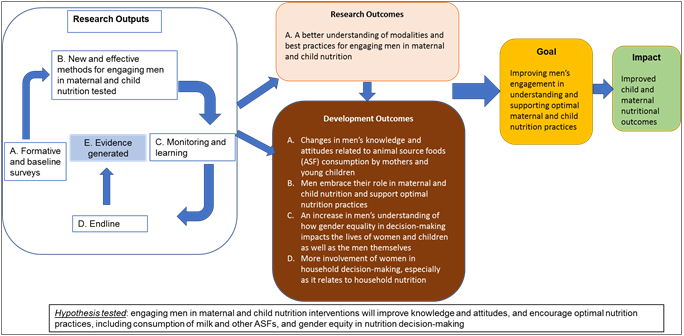Project in Rwanda
Engaging men in supporting maternal and child consumption of milk and other animal source foods in Rwanda
Timeline: February 2020 - December 2021
Funding: USAID
Affiliated project: Enhancing Milk Quality and Consumption for Improved Income and Nutrition in Rwanda
Principal investigator (PI) and lead institution
- Emily Ouma, International Livestock Research Institute (ILRI)
Co-PI and collaborator institutions
- Valerie Flax, RTI International (and University of North Carolina)
- Jesse Routte, Three Stones International
Results
Colverson, K.E. 2021. Engaging men in supporting maternal and child consumption of milk and other animal source foods in Rwanda. A facilitator’s guide. Nairobi, Kenya: ILRI
Farnworth, C.R., Jumba, H., Otieno, P.E., Galie, A., Ouma, E., Flax, V.L., Schreiner, M.-A., Colverson, K.E. 2023. Gender roles and masculinities in leveraging milk for household nutrition: Evidence from two districts in Rwanda. Food Policy, Volume 118. https://doi.org/10.1016/j.foodpol.2023.102486
Flax, V.L., Ouma, E.A., Schreiner, M-A., Ufitinema, A., Niyonzima, E., Colverson K.E., and Galiè, A. 2023. Engaging fathers to support child nutrition increases frequency of children’s animal source food consumption in Rwanda. PLoS ONE 18(4): e0283813. https://doi.org/10.1371/journal.pone.0283813
Video: Gabura Amata Mubyeyi: Engaging men in supporting maternal and child consumption of milk in Rwanda
For more results and resources, visit the companion project page.
Project Plan
Maternal and child nutrition practices, including consumption of milk and animal source foods, are considered the responsibility of women in many low- and middle-income countries. However, men can influence nutrition in their households through their decision-making, control of resources, and social support. Despite the role of gender and the importance of men in influencing nutrition in their households, most nutrition programs target women, and men are not comfortable participating. There is very little evidence on feasible, effective, and acceptable ways to involve men in maternal and child nutrition.
The main objective of this research project was to develop, implement, and evaluate an intervention to engage men in maternal and child nutrition—especially milk and animal-source food consumption.
Objectives
Specifically, this study:
1) Assessed men’s and women’s perceptions of their own and each other’s roles in nutrition, especially animal-source food production, consumption and purchasing, and the gender dynamics affecting these roles
2) Assessed men’s preferences on engagement in maternal and child nutrition, and women’s preferences on how they want men to be engaged, and identify potential barriers and enablers to their engagement
3) Designed and implement a nutrition intervention for men, which facilitates their engagement in and support for nutrition, including consumption of milk produced in the household and other optimal maternal and child nutrition practices promoted in our project on animal-source food interventions
4) Documented the implementation process and evaluate the intervention, including measurement of how men and women perceive the information and skills acquired and how they utilize the information to improve household nutrition, and decision making around nutrition.
This study contributed to the Livestock Systems Innovation Lab's food production and marketing Area of Inquiry and its goal of linking gender, nutrition, and livestock value chains.

Feed the Future Innovation Lab for Livestock Systems is part of Feed the Future





